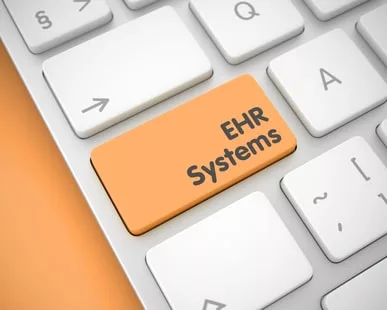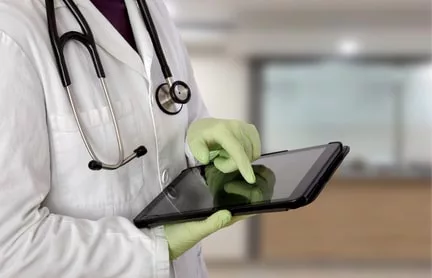The list of ways electronic health records (EHR) improve every aspect of healthcare is a long one. Aside from making the lives of healthcare providers easier, they improve patient care and safety as well. Like many health information systems, EHRs put more valuable data at providers’ fingertips and help to manage clinical data to aid in clinical decision-making and streamline time-intensive processes. Here’s a look at a few of the ways EHR adoption can make a big impact on the quality of patient care.
EHRs Improve Portability and Sharing

You may be the patient’s primary care provider, but it’s unlikely that you’re the only doctor they see. Patients may have several doctors ranging from cardiologists to dermatologists. It’s important that every doctor a patient sees has the same knowledge. Overlaps in patient care without EHRs means some of their providers have only a fragmented view of the patient’s history, current diagnoses, and treatments. This could lead to several problems.
EHRs provide a means for patients to share their records with all their doctors and make sure the information is up to date. EHRs ensure that every provider in the patient’s chain of care understands which medications they are taking, and any other treatment plans they may be using.
EHRs Get Patients Involved in Their Care
Without EHRs, patients couldn’t enjoy patient portals, mobile health apps, and medical websites which are critical incentives that help get patients more involved in their care. EHR-enabled patient portals provide patients with access to important healthcare information, such as vaccination history, lab and other diagnostic test results, medications and diagnoses, and more. Instead of asking for a printed version which requires a trip back to the provider’s practice, patients can simply log in to the patient portal for easy access to the information they need.
Most patients have access to email, and a few may have a fax machine, but sharing information via these methods means the records aren’t always up to date. EHRs give the patient access to current medical records, and they allow them to review notes or treatment results in near real-time – and many even allow patients to send messages to providers within a secure system. Allowing patients access to their medical records puts them in the decision-making process with you, giving them more control over their care. It may also help them understand your decisions as well.
Improved Decision Making

When providers are equipped with complete patient health information, healthcare providers can more easily arrive at diagnoses. While that’s obviously a crucial piece of the healthcare picture, avoiding mistakes is equally imperative, and reliable EHRs can help providers do just that. How? EHRs keep track of important details like patient allergies, and they can also alert physicians when a new medication is prescribed that’s contraindicated based on the patient’s other medications, health conditions, or allergies.
The same principle applies to care teams. It’s easier to delegate responsibilities and coordinate as a team if everyone has access to the same information in near real-time. Clinical staff can do their jobs, and the physician can review it with the patient whenever they see fit. EHRs improve productivity on almost every level from sharing records to enhancing decision-making.
Reducing Workloads
Proper training and design make the EHR fit into your current workflow. Again, EHRs improve productivity and reduce the time providers have to spend on each patient. Tools that aid in clinical decision-making reduce cognitive workloads as well. Many EHR platforms help to streamline processes such as scheduling follow-up appointments, sending patients reminders about upcoming appointments, and even facilitating medication refills by transmitting information to the patient’s pharmacy.
Analytics and reports, which can be altered and adapted to fit the needs of a practice or patient, show providers and clinical staff a picture of a patient’s health without the need to pour over previous records by hand. These snapshots of a patient’s health help you provide better care while reducing the drain on your time and cognitive functions.
EHRs Help Improve Care Coordination
Care teams are improving healthcare on their own. Physicians, nurses, specialists, and other staff come together as a unit to care for all of a patient’s needs. However, this may mean that each member of the care team spends less time with a patient compared to pre-EHR periods. Without the overview an EHR provides, the care team’s view of a patient may become fragmented.
Like we mentioned previously, a patient may see multiple providers from primary care to specialists. They may make frequent or even occasional trips to the ER which adds new members, albeit temporary ones, to their care team. EHRs prevent all of these circumstances from fragmenting the patient’s records, and it makes sure each team member sees a picture of the patient’s overall health. The ability to improve collaborative care is a significant gold star in favor of EHRs.
Whether your patients need an extensive care team or a single provider, an EHR will improve the care you or the care team provide patients. EHRs eliminate many of the barriers physicians face, especially communication and decision-making barriers. Bonuses to productivity and lightening the workload surrounding a patient help remove impediments as well.
While EHRs provide many benefits that improve patient care, these benefits are amplified when interoperability is achieved, allowing for the seamless sharing of data across providers and organizations in real-time. With a proven API solution, you can exchange healthcare information across any EHR platform, saving providers and staff alike valuable time on tedious, manual tasks – all without sacrificing PHI security.
